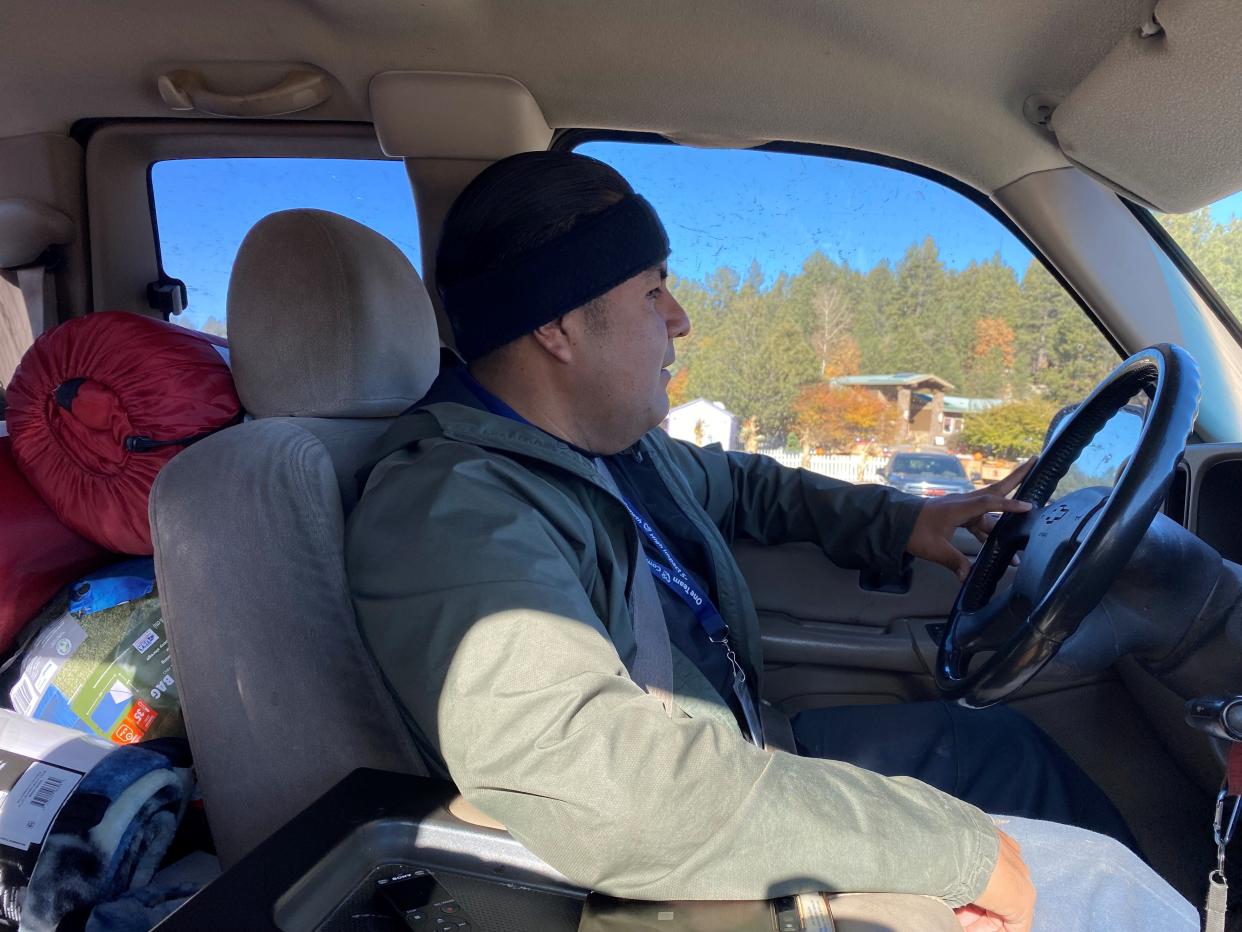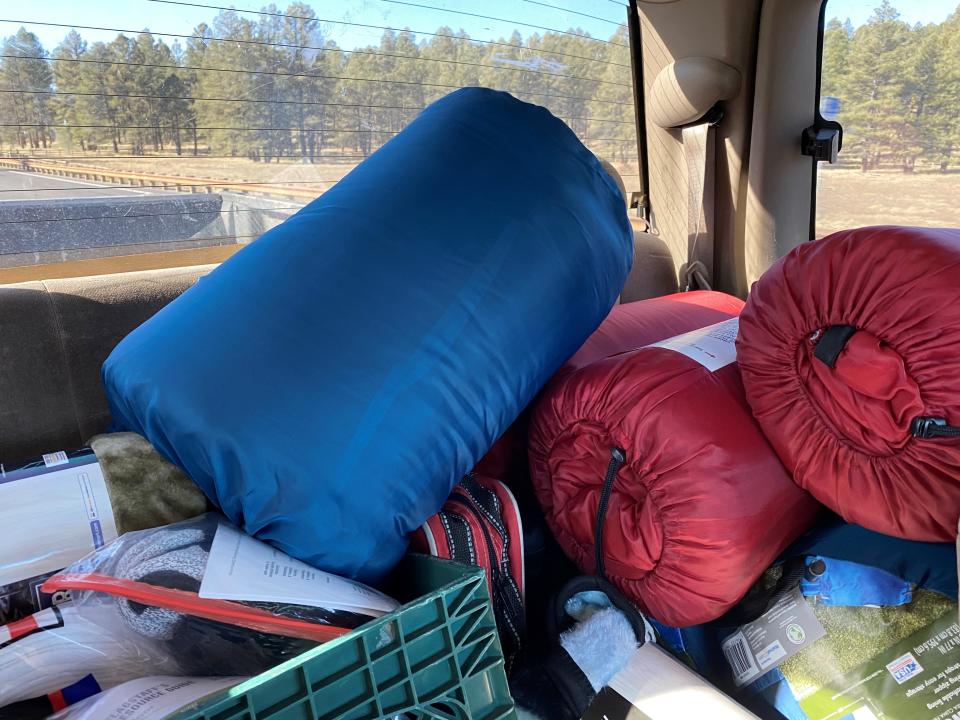Catholic Charities' PATH program helps unsheltered people living on public lands

On a crisp October morning, Dwight Manuel loaded up his 2004 Chevy Silverado pickup truck with sleeping bags, plush blankets and packages stuffed with socks, beanies and tubes of ChapStick. He pulled out of the parking lot in downtown Flagstaff where he works and began driving, zigzagging across northern Arizona’s highways and forest roads, looking for strangers in need of help.
Manuel is part of Catholic Charities' PATH team, which conducts specialized outreach to unsheltered people living in national forests, local parks and underground sewage tunnels.
Created in 2005, the Projects for Assistance in Transition from Homelessness team distributes a slew of items and resources that can be literally lifesaving, from six-gallon water jugs in the brutal summer heat to tents and hand warmers on frosty winter days. The team also works to get unhoused people into shelters, connect them with resources and relocate them to safety when wildfires or harsh winters strike.
“It’s mainly our job to go out there and just engage,” said PATH supervisor Richard Brust, who has been doing outreach near Flagstaff for over a decade.
The PATH team’s work is becoming increasingly essential. As rents continue to rise, so, too, does the number of unsheltered people living on public lands or in other public spaces. Some people choose to live off-grid. Others use substances or have a serious mental illness and end up unsheltered. A growing number are simply no longer able to afford a place to live.
Permanent campers: Rising rents are pushing people to live on public lands
Since 2017, the PATH team has conducted outreach to over 2,000 people experiencing homelessness in Coconino County alone.
That includes Pamela Karr-Wiseman and Daniel Wiseman, who were evicted after losing their jobs near the start of the COVID-19 pandemic. They have been unsheltered ever since.
“We had a place, we had a car, we had a life, the whole nine,” Karr-Wiseman said.
After months spent traveling around Arizona, the couple of 28 years, along with their rescue dog, Anyiah, eventually set up camp off of a dirt road deep in the Coconino National Forest.
Soon after arriving there, Wiseman and Karr-Wiseman connected with PATH Outreach Specialist Sara Annibal, who was able to help them get copies of their birth certificates and government IDs. They have since remained in regular contact with Annibal and are waiting to get into stable housing.
Karr-Wiseman and Wiseman said the help they’ve received from the PATH team has been life-changing.
“We wouldn’t have made it without Catholic Charities and Sara,” Karr-Wiseman said. “We’re definitely getting on our feet here because of the assistance of Catholic Charities.”
Increasing unhoused population: Arizona has one of the worst homelessness crises in the nation, federal data shows
PATH staffers brave natural disasters, freezing temps
Operating all year round means the PATH team has to brave northern Arizona’s freezing winter weather and lengthening wildfire season.
One Sunday in the summer of 2022, Manuel was enjoying his day off when he saw a plume of smoke behind Mount Elden. He knew people were camping there and were in danger.
Without hesitating, he jumped into his pickup truck and headed toward the fire, he said. He wound up relocating three people to safety that day, and throughout the fire's lifespan, he and Annibal would help evacuate more than a dozen others.
That was one of the most fulfilling days on the job so far, Manuel said. A social worker and former Marine, he credits his military background for training him to act fast in the face of crisis.
“I’m always ready for anything... especially during fire season,” he said. “Things can happen. And they happen quickly.”
Permanent campers: Rising rents are pushing people to live on public lands
The team also does winter outreach, making overnight rounds when temperatures dip to 10 degrees or below or if there are two or more inches of snow on the ground. Outreach specialists like Manuel and Annibal pass out care packages with cold-weather essentials, like hand warmers and emergency blankets, and help get people out of the cold.
Some people only agree to go to a shelter or motel on the coldest days, then prefer to return to their camps, Manuel said.
For those that don’t accept services or aren’t reached in time, the situations can sometimes end in tragedy, either due to harsh winter conditions, health conditions, acts of violence or substance use.
“We’ve actually run across a few people that didn’t make it,” Brust said.
Covering hundreds of miles to make an impact
Since its inception almost two decades ago, the PATH team has expanded its outreach, now covering hundreds of miles across Coconino, Mohave and Yavapai counties. Since 2017, it has given out over 10,000 supplies in Coconino County and enrolled over 200 people in its case management program.

Conducting direct outreach is just one aspect of the PATH team’s job. Once a person agrees to receive case management services, a team member can help them sign up for food stamps, get a cell phone or bus pass, connect with loved ones across state lines and more.
Catholic Charities also provides housing for people in need, including 100 permanent supportive housing units, a family shelter in Flagstaff and a shelter in Bullhead City.
Because many unhoused people travel south once it turns cold, the PATH team sees many more people in the summer than in the winter.
Over 1,200 people were experiencing homelessness in Coconino, Mohave and Yavapai counties in the winter of 2022, and more than half were unsheltered, according to the annual point-in-time count. But because the point-in-time count only takes place in the winter, there is no reliable count for how many unhoused people there are during the summer, when the number is almost certainly higher.
The hardest part of the PATH team’s job isn’t doing direct outreach in below-freezing temperatures or saving people from wildfires. It’s not always being able to meet clients’ needs, Manuel said. Because of the nationwide scarcity of affordable housing, finding people a place to live can be a process that drags on for months.
After five months, Wiseman and Karr-Wiseman are still waiting to get into permanent housing. The couple is holding out hope that the PATH team will help them find a home soon.
“I know we’re progressing every day,” Karr-Wiseman said. “So it can’t be a bad thing, right?”
Juliette Rihl covers housing insecurity and homelessness for The Arizona Republic. She can be reached at jrihl@arizonarepublic.com or on Twitter @julietterihl. Coverage of housing insecurity on azcentral.com and in The Arizona Republic is supported by a grant from the Arizona Community Foundation.
Contact northern Arizona reporter Lacey Latch at llatch@gannett.com or on social media @laceylatch. Coverage of northern Arizona on azcentral.com and in The Arizona Republic is funded by the nonprofit Report for America and a grant from the Vitalyst Health Foundation in association with The Arizona Republic.
This article originally appeared on Arizona Republic: Catholic Charities' PATH team helps unhoused people in northern Arizona

